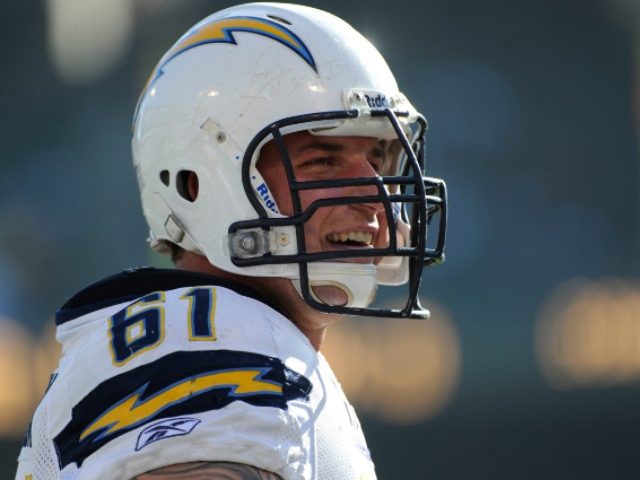Former NFL center Nick Hardwick, who retired in 2014 due to a neck injury, would “100 percent” allow his two sons to play football because of the positive lessons the sport provides.
“It shaped me as a man from a maturity standpoint, with the necessary learning of how to handle both success and defeat,” wrote Hardwick, a former San Diego Charger, in a guest column for NBCSports.com. “Football players can leave the game at age 30, with the wisdom of a much older man.”
Hardwick, now a radio host in San Diego, feels football “added to his life.”
“When the worth of football is being evaluated by skeptical parents and politicians, what gets lost in the conversation on the game’s health and safety issues comes down to a really simple question: Did it add more to your life or take away more? Asked Hardwick. “Without a doubt, it added more to my life.”
The Purdue-graduate feels that football’s risk adds to his its appeal.
“We know it’s dangerous and know there are potentially bad outcomes,” Hardwick wrote. “That’s part of what makes it fun in the first place. Football gives football players what they want out of their life experience. Further, for even a more select few, it gives them what they NEED in life.”
Hardwick says he had six concussions during his playing days, and did have some mood swings after his retirement, but thanks to the help of a program started by a NAVY seal, he’s in a much better place right now.
“At age 37, I didn’t want whatever neurologic decline had already occurred to continue without me becoming more proactive,” Hardwick wrote. “My emotional highs and lows were unnatural, unwanted, and unacceptable. That’s when I remembered my conversations with my Navy SEAL pal, Pat, and immediately googled ‘Brain Treatment Center San Diego.’ For five days a week over six weeks, I went back and sat in that same chair, sending magnetic stimulation into the targeted areas of my brain, at first to assemble neuronal activity, and then to mobilize it in the right pattern. The results showed there were improved physical changes in my brain activity following the treatment.
“I’m two or three months past my last treatment, and I can honestly say my brain is in a better place than it was before. The emotional highs and lows I was living with have been stabilized. My cognition took off during that period and it hasn’t slowed down since. Overall, I’d definitely recommend the treatment to other former football players.”
But what Hardwick wouldn’t recommend is people playing through concussions like he did. Medical research has determined that rest is the best way to heal concussions, and getting back on the field too soon is a bad idea.
“I had accumulated about 25,000-plus head hits over the course of my playing career,” Hardwick wrote. “It’s easy to see the hits accumulate quickly at the position I played. I was diagnosed with six verified concussions in the NFL, but I still never missed a game due to one of them, a gut-it-out approach I would not recommend to kids or anyone else.”
But with all the safety measures implemented the last couple of years, like safer helmets and rule changes cracking down on helmet-to-helmet hits, Hardwick would allow his two sons to play football if they so choose.
“I would, 100 percent (let my kids play football),” Hardwick wrote. “Admittedly, immediately out of the league (in 2014), I would’ve given a different answer than now. But the dust has settled after my retirement due to injury.
“While the negative press about the dangers of the sport has died down over the past couple of years thanks to the necessary rule changes the NFL implemented, our awareness is still heightened.”

COMMENTS
Please let us know if you're having issues with commenting.